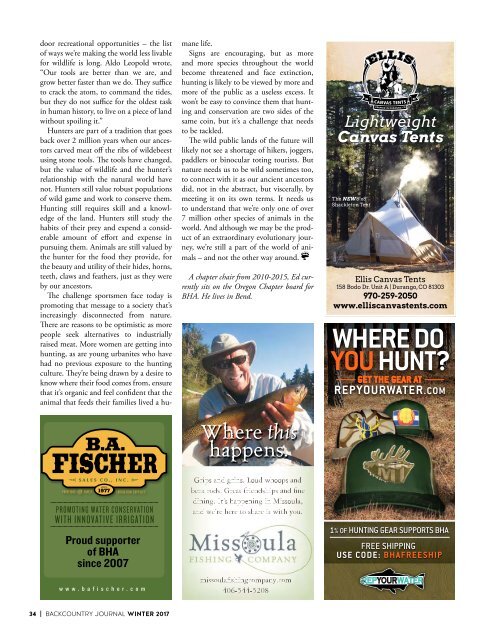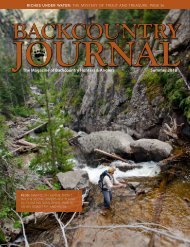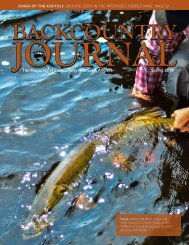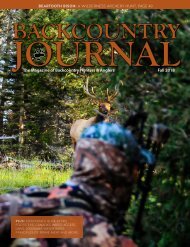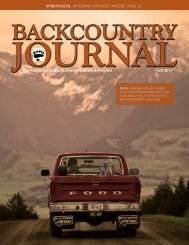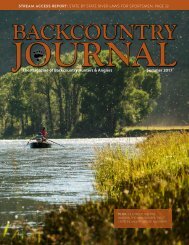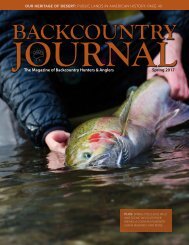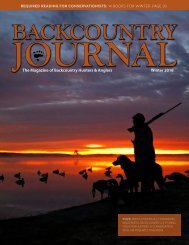BCJ_WINTER17 Digital Edition
Create successful ePaper yourself
Turn your PDF publications into a flip-book with our unique Google optimized e-Paper software.
door recreational opportunities – the list<br />
of ways we’re making the world less livable<br />
for wildlife is long. Aldo Leopold wrote,<br />
“Our tools are better than we are, and<br />
grow better faster than we do. They suffice<br />
to crack the atom, to command the tides,<br />
but they do not suffice for the oldest task<br />
in human history, to live on a piece of land<br />
without spoiling it.”<br />
Hunters are part of a tradition that goes<br />
back over 2 million years when our ancestors<br />
carved meat off the ribs of wildebeest<br />
using stone tools. The tools have changed,<br />
but the value of wildlife and the hunter’s<br />
relationship with the natural world have<br />
not. Hunters still value robust populations<br />
of wild game and work to conserve them.<br />
Hunting still requires skill and a knowledge<br />
of the land. Hunters still study the<br />
habits of their prey and expend a considerable<br />
amount of effort and expense in<br />
pursuing them. Animals are still valued by<br />
the hunter for the food they provide, for<br />
the beauty and utility of their hides, horns,<br />
teeth, claws and feathers, just as they were<br />
by our ancestors.<br />
The challenge sportsmen face today is<br />
promoting that message to a society that’s<br />
increasingly disconnected from nature.<br />
There are reasons to be optimistic as more<br />
people seek alternatives to industrially<br />
raised meat. More women are getting into<br />
hunting, as are young urbanites who have<br />
had no previous exposure to the hunting<br />
culture. They’re being drawn by a desire to<br />
know where their food comes from, ensure<br />
that it’s organic and feel confident that the<br />
animal that feeds their families lived a humane<br />
life.<br />
Signs are encouraging, but as more<br />
and more species throughout the world<br />
become threatened and face extinction,<br />
hunting is likely to be viewed by more and<br />
more of the public as a useless excess. It<br />
won’t be easy to convince them that hunting<br />
and conservation are two sides of the<br />
same coin, but it’s a challenge that needs<br />
to be tackled.<br />
The wild public lands of the future will<br />
likely not see a shortage of hikers, joggers,<br />
paddlers or binocular toting tourists. But<br />
nature needs us to be wild sometimes too,<br />
to connect with it as our ancient ancestors<br />
did, not in the abstract, but viscerally, by<br />
meeting it on its own terms. It needs us<br />
to understand that we’re only one of over<br />
7 million other species of animals in the<br />
world. And although we may be the product<br />
of an extraordinary evolutionary journey,<br />
we’re still a part of the world of animals<br />
– and not the other way around.<br />
A chapter chair from 2010-2015, Ed currently<br />
sits on the Oregon Chapter board for<br />
BHA. He lives in Bend.<br />
Where this<br />
happens.<br />
Grips and grins. Loud whoops and<br />
bent rods. Great friendships and fine<br />
dining. It’s happening in Missoula,<br />
and we‘re here to share it with you.<br />
Lightweight<br />
Canvas Tents<br />
The NEW 8’x8’<br />
Shackleton Tent<br />
Ellis Canvas Tents<br />
158 Bodo Dr. Unit A | Durango, CO 81303<br />
970-259-2050<br />
www.elliscanvastents.com<br />
missoulafishingcompany.com<br />
406-544-5208<br />
34 | BACKCOUNTRY JOURNAL WINTER 2017


